Understand What Custom CRM Development Process Means
Let’s go through the steps in custom CRM development. If you understand the flow, it will provide you valuable insight into the development process.
Step 1. Partner with a top tech team
To understand this step, you need to imagine for the moment that you have spent a lot of time looking for outsourced software development businesses. You have now chosen the best-fit one, like ArtCodeVision, and left a message on their contact form. It directly reaches the manager of business development. The specialist gets in touch to set up a more in-depth meeting on your project. You schedule a time and jump on a call to discuss your idea, get a CRM development estimate, and align visions of future collaboration.
Step 2. Discovery phase
Since it shapes the concept, this stage is essential for growth. Meetings in the discovery phase allow a business analyst to compile data on your company, objectives, and project proposal. Once all the data is acquired, the business analyst puts it in a thorough specification to support the creation of a final project estimate. Apart from that, during the discovery stage, UI/UX designers produce wireframes for every screen of a future CRM app.
Step 3. Design of your CRM
UI/UX designers start creating future CRM mock-ups after prep work is completed. They use cutting-edge UI/UX design techniques, your needs, and wireframes developed during the Discovery Phase to help produce excellent mock-ups that fit your vision and requirements.
Step 4. CRM development
Designers give all mock-ups to the development team as the design process ends. With their tech knowledge, developers turn aesthetically pleasing mock-ups into functional products. The CRM development process consists of sprints. CRM specialists have to apply a certain portion of the functionality of the CRM during every sprint, which normally lasts two weeks.
Step 5. Ensuring top-level CRM quality
It is difficult to provide a bug-free product without thorough testing. During this step, QA engineers perform thorough quality testing to identify issues and anomalies. After tests, QA engineers compile the findings into bug reports and deliver them to developers. Bug reports indicate the program’s condition at the time of the issue. This information allows developers to reproduce the problem and resolve it early on.
And that’s basically it. Please keep in mind that custom CRM applications also require ongoing maintenance and improvement to ensure success. It’s best to continue working with your CRM development team to make sure that your product is reaching its full potential.
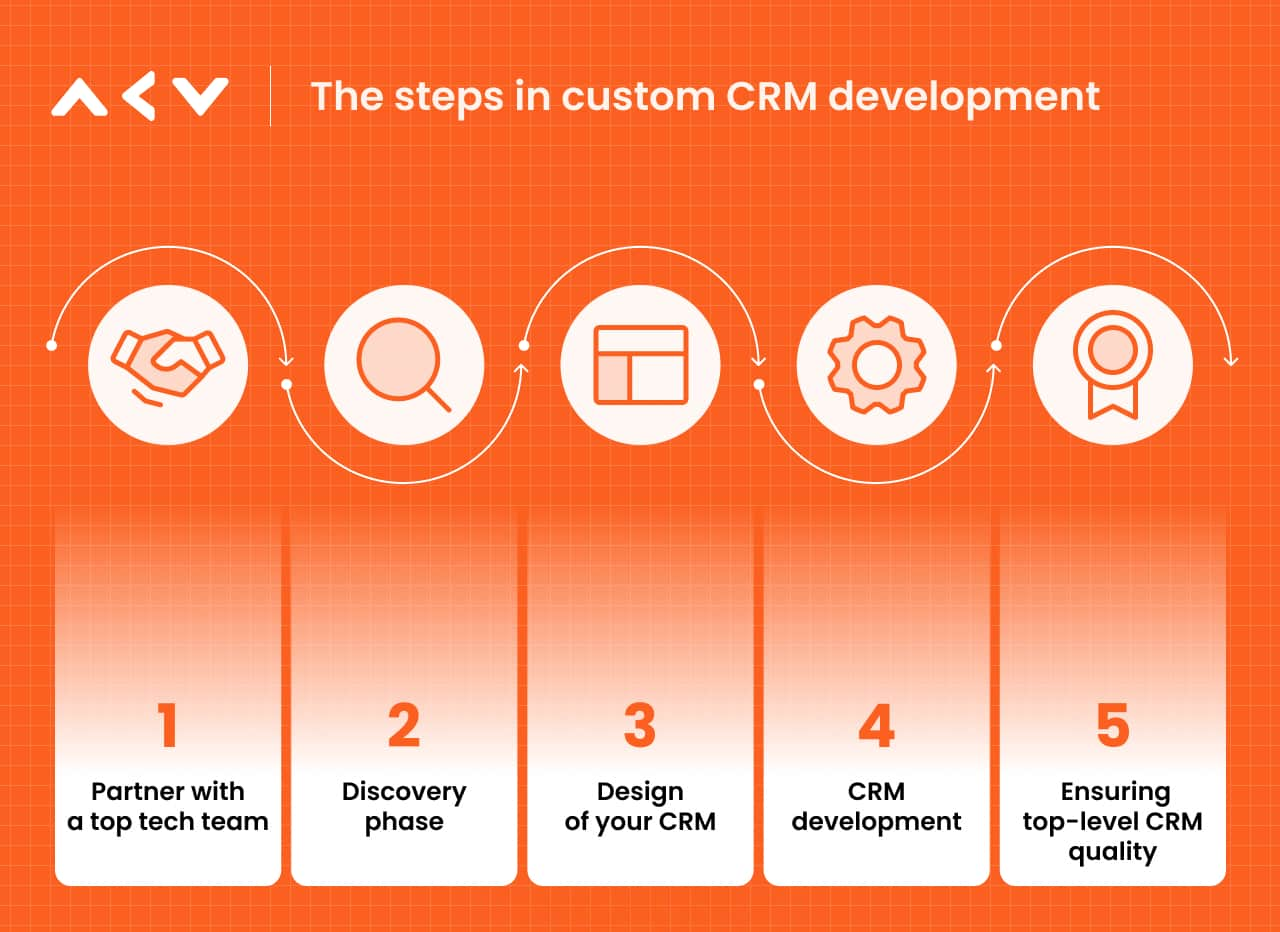
Factors Influencing Custom CRM Development Costs
Here are some of the things that affect how much it costs to make CRM software:
#1 Complexity & number of features
The most important features, like keeping track of leads and handling contacts, cost between $5,000 and $10,000. Features like predicting sales, marketing that is done automatically, and data powered by AI can cost anywhere from $20,000 to $50,000 or more.
How much does it cost? $5,000 – $50,000+
#2 Integrations
A simple interaction might cost around $1,000 to $5,000, but a more complicated one will likely cost over $10,000. Costs depend on how hard the interactions are and how many systems are involved.
How much does it cost? $1,000 – $10,000+
#3 Customization level
Depending on your project, you might need a different type of skill set to make a solution that fits perfectly with a niche’s specific processes and workflows. The more complex the demands, the higher the cost.
How much does it cost? Varies
#4 Type of the tech team
The yearly compensation range of in-house development teams is from $90,000 to $130,000 in the US, which might result in quite an expense. However, outsourcing custom CRM development with hourly prices ranging from $25 to $150 is more financially sensible.
How much does it cost? $25-$150/hr or $80,000 – $130,000/year
To get a rough idea of how much it will cost to customize a CRM system, you should talk to software development companies that focus on CRM development. These professionals can look at your needs, talk you through the steps of development, and give you a detailed cost breakdown. When getting an estimate, here are some important costs to think about:
#1 Development hours
The number of hours needed for planning, designing, building, testing, and deploying could be anywhere from 1,000 to 5,000 hours, based on how complicated the project is.
Price: From $25 per hour
#2 Tech stack
Technology choice, frameworks, programming languages, databases, and other factors may all greatly affect the final price. Additionally, proprietary solutions can have expensive licensing costs.
Price: Very variable; licensing costs may go over $10,000
#3 Integrations
Your project might need third-party integrations, which can add to the cost, as well as API integrations and data synchronization. Depending on the size of the business, fees for integrating a famous marketing automation tool like HubSpot or Marketo can range from $45 to $900 per month.
Price: $45-$900 monthly
Note that it is very important to budget for long-term maintenance, updates, troubleshooting, and customer support in the long run. For example, maintenance and updates can cost from $200-300 to $4,000+ monthly, while scalability and future enhancements don’t have a set range, as everything depends on your particular CRM needs.
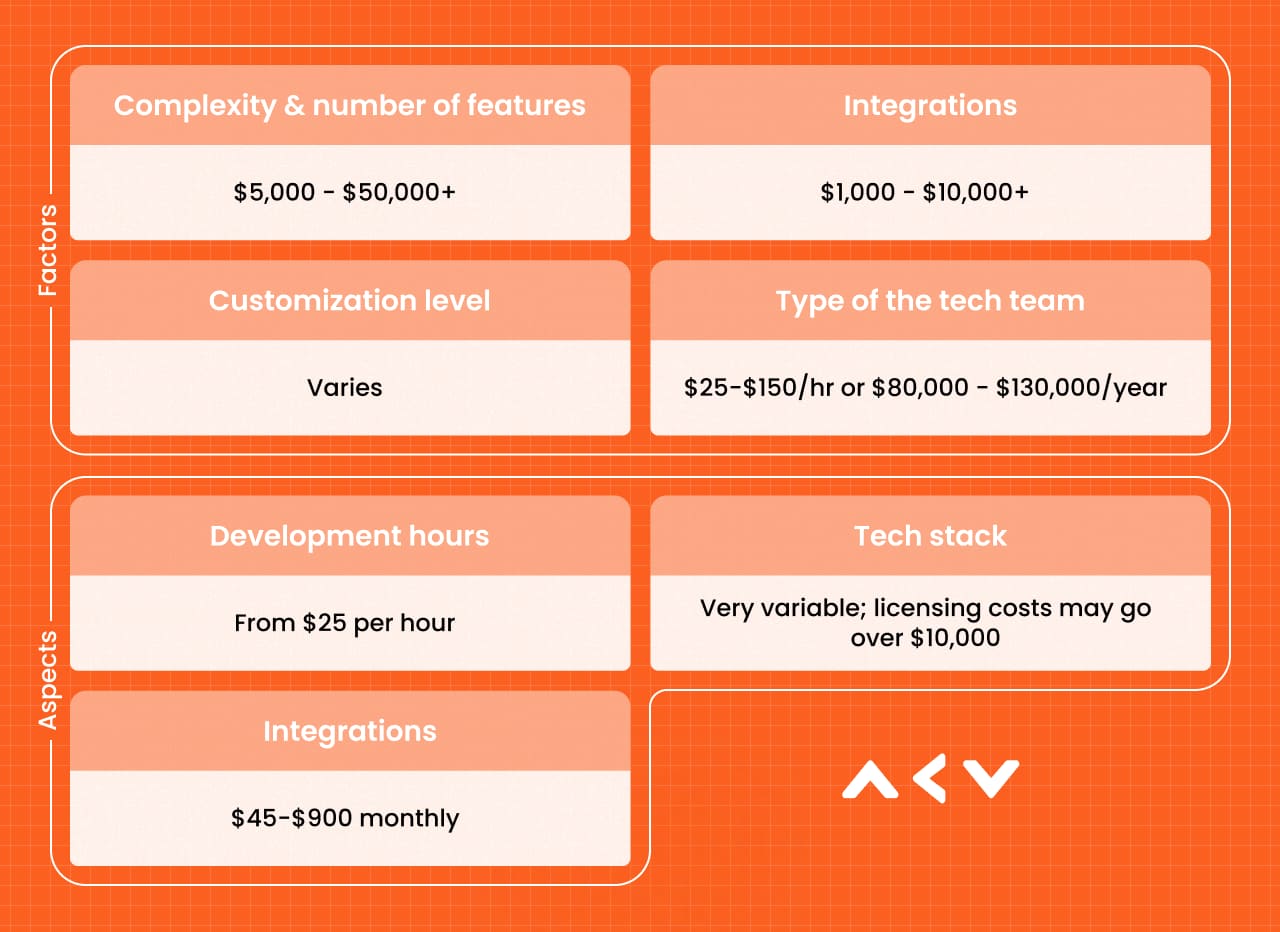
Breakdown of Custom CRM Development Features
The goals and needs of your business are what drive your CRM development and modern tech variety gives you more freedom of action. The only thing that limits you is the amount of money you want to spend on making a custom CRM. Let’s explore all the pros and cons of choosing custom CRM development to see if it’s worth it.
Pros
- Designed to satisfy your demands. Custom-built CRM that meets your goals, needs, and niche specifics. Your CRM runs the way you wish; thus, there are no unnecessary features, unneeded modules, or strange UX/UI solutions. For example, this is essential in the healthcare sector. Custom development means complete adherence to all the regulations needed for the creation of healthcare CRM systems.
- Quick onboarding. Custom CRM is created with your processes in mind; therefore, businesses will need less time to fit new technologies and minimize errors during the onboarding process.
- Scalability. Your own CRM may help you build the basis of future corporate growth depending on needs. All you have to do is tell the tech partner precisely how you want to grow your company going forward and what characteristics will be required for that.
- In-house or third-party software integrations. Certain business niches need specific integrations. Custom development can take into account any unique needs and make sure that your CRM works well with other programs.
Cons
- Not cheap. All the benefits we talked about above are not free. Custom CRM solutions take time and money. But if you outsource developers and use all the tips on cutting costs we’ll talk about below, you can minimize it.
- Help and maintenance. Support is key for all software, and since you own CRM, you have to take care of its upkeep. Unless you work with a software developer on a long-term basis to support CRM with changes and improvements based on your needs, you’ll still have to pay for it.
Now that you know about all the benefits and challenges, let’s break down all the custom CRM development features.
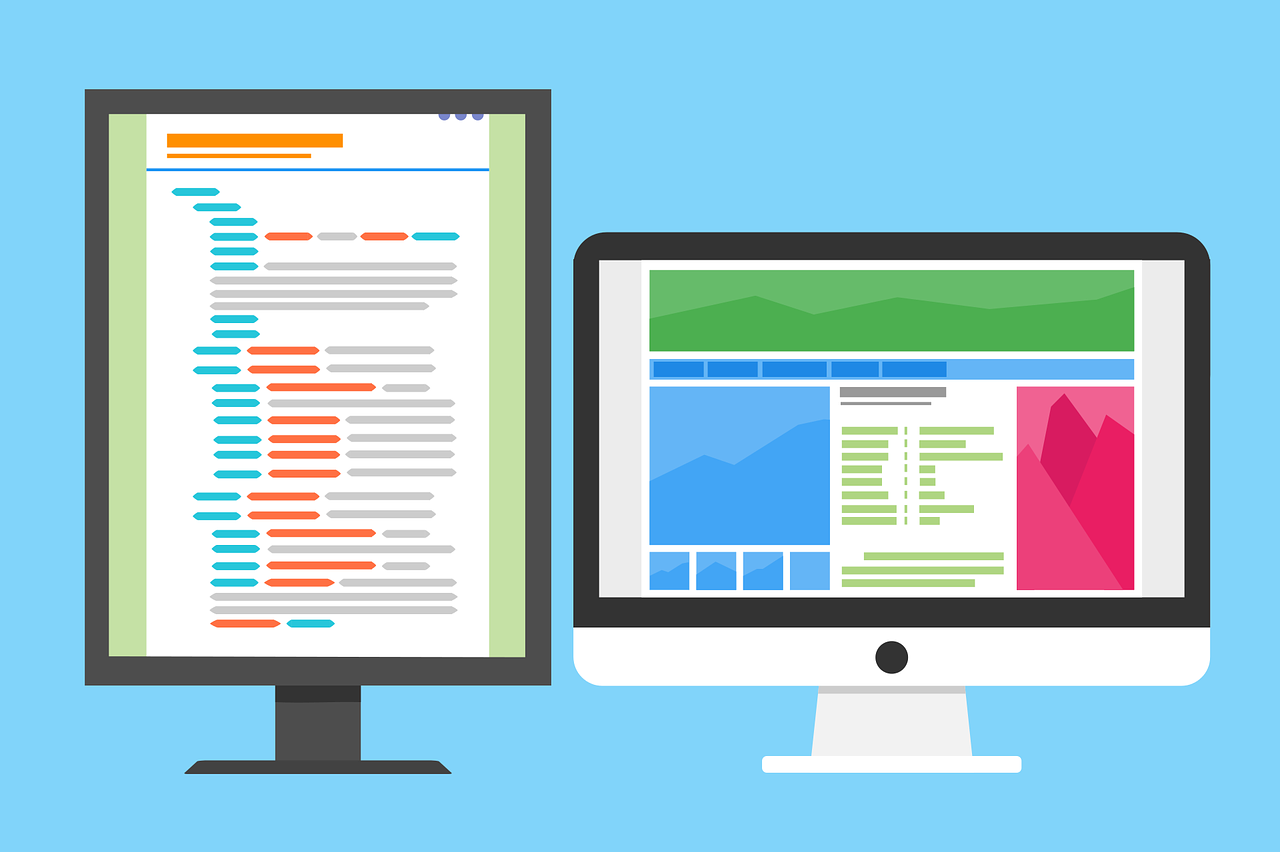
CRM features you need
Custom CRM software combines many parts and features that work together to make the system work well and efficiently. Let’s look at the most important parts and benefits of building a custom CRM system.
#1 Management of the contacts
This feature allows businesses to store customer information like names, addresses, and emails. Contact management can also keep track of all interactions. Keeping a record of customers helps businesses communicate better and interact with clients in a more personal way.
#2 Management of leads and sales pipelines
Businesses can keep track of leads and convert them with the help of lead management and sales flow tools. This includes getting leads, rating them, sending them out, and keeping track of their progress through the sales process steps. Adding these features will help businesses organize their work, find weak spots, and make the best use of their sales strategies.
#3 Keeping track of opportunities and deals
Businesses can keep an eye on and handle potential sales by keeping track of opportunities and deals. This feature includes stages, assignments, and reminders. It gives teams information about the sales process, which helps them make decisions based on data and predict income.
#4 Analytics & Reporting
Reports on customer behavior, sales, and marketing help businesses make the right choices based on real-time data. That’s why custom CRM systems need to have reports on sales, customers, campaigns, and collected data.
#5 Workflow automation
Automation speeds up tasks that businesses do regularly, like giving leads, starting email marketing, keeping track of deal steps, and sending out alerts. This function cuts down on manual work, lowers the risk of human-factor mistakes, and boosts production.
#6 Adding 3rd-party features
Adding third-party integrations to your custom CRM elevates it and makes sharing data easier. The most common integrations include emails, marketing automation, social media, and financial tools.
#7 Mobile accessibility
With mobile-friendly CRM systems, sales teams can use phones and apps to get to customer data, change information, and do other important tasks. Teams can work on the go with this feature, which makes them more productive.
#8 User interface and dashboard customization
Customization can make your CRM system much easier to use. This includes easy-to-use layouts, access limitations, and visuals to get quick insights. A well-thought-out interface improves the CRM experience, reduces training time, and boosts efficiency.
#9 Safety and access control
A key part of any CRM is keeping customer info safe. These features include users’ ability to log in, see other logins, access limited functionality, and use data encryption. Adding those can keep private information safe, avoid changes by mistake, block unauthorized access, and meet business standards.
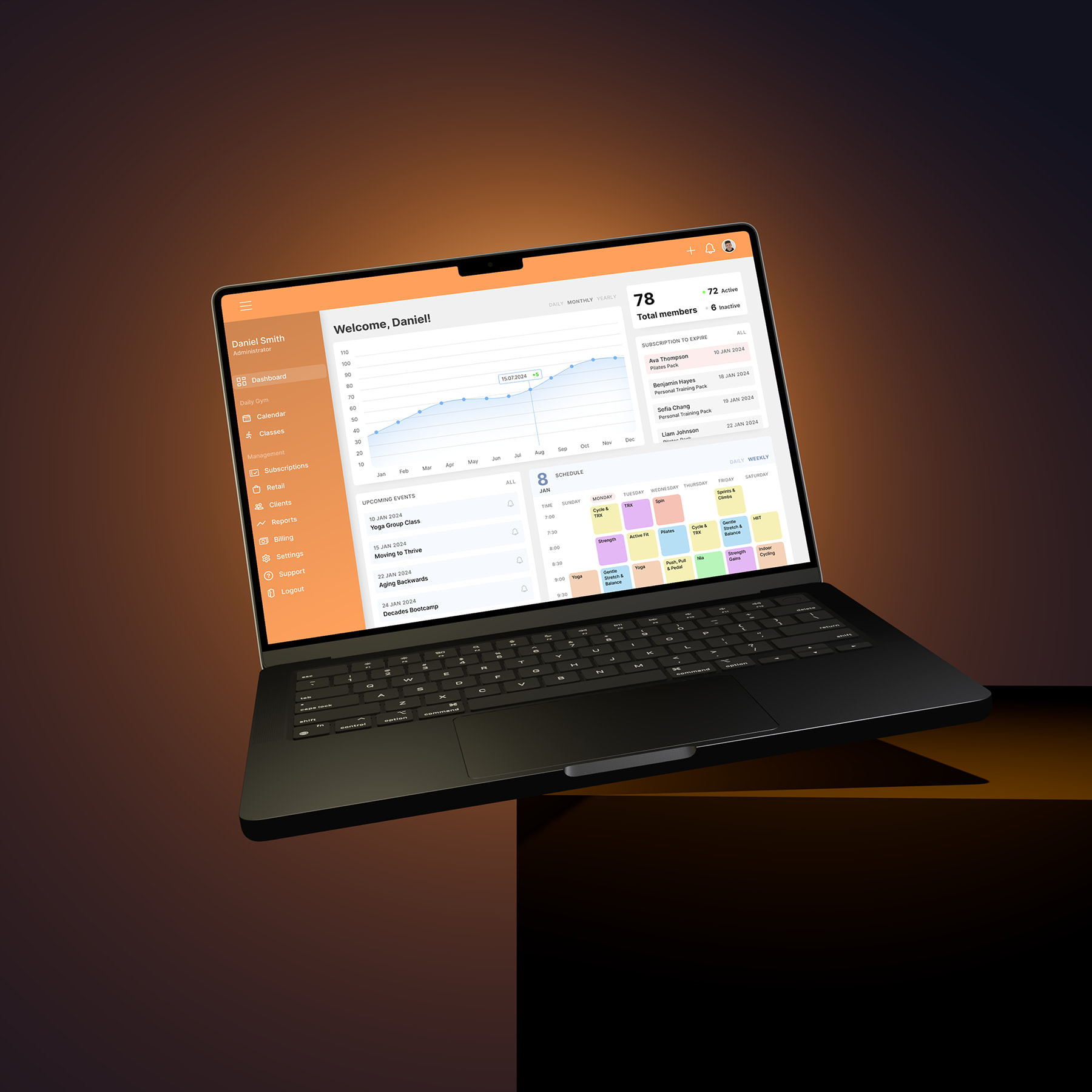
Tips for Lowering Custom CRM Development Costs
Building a CRM system can cost a lot of money, but there are ways to cut CRM development pricing without lowering quality. Our specialists prepared the best ways to keep the costs of CRM development as low as possible.
Focusing on top-priority features
When building a custom CRM, figure out which core features will help you reach your business goals and give you the most value. Don’t add “nice-to-have” features that aren’t critical at first to save at first. Think about them for later versions after the core system is set up and your CRM is earning you money.
Using agile development
The agile development method can help you save money. This flexible method makes on truly what’s needed. All the doable sprints make it easier to get feedback and put the most important tasks first, which ensures early benefits and less expensive changes or redos later on.
Using CRM systems or frameworks that are free and open-source
As a base, you might want to use open-source CRM tools like SuiteCRM, VTiger, or Odoo. They offer features and modules that can be changed to fit your needs and cut down on development time and costs compared to starting from scratch. Open-source platforms have groups, documentation, and tools that help with development and make it easier for businesses to adopt.
Looking into software methods and tools that are good value for money
When you’re developing a CRM, pick choices that are budget-friendly and have strong communities. Open-source languages like PHP, Python, or JavaScript (Laravel, Django, and React) offer tools that speed up development. For storage, use affordable cloud platforms like AWS, Google Cloud, or Azure, which give you budget-friendly freedom. Think about low-code or no-code systems for easy-to-use CRMs that require little or no special development.
Picking a tech team that offers cost-effective solutions
Being open about the budget and goals from the start will help you come up with answers that are in line with your needs. For better control, negotiate fixed-price contracts or milestone payments. If you want to escape expensive fixes, put quality over lower prices and hire teams with a lot of experience.
The cost of CRM development services in ArtCodeVision
ArtCodeVision works on CRMs of different complexities. The CRM development cost for small business and companies of different sizes is also different as the size of the project varies.
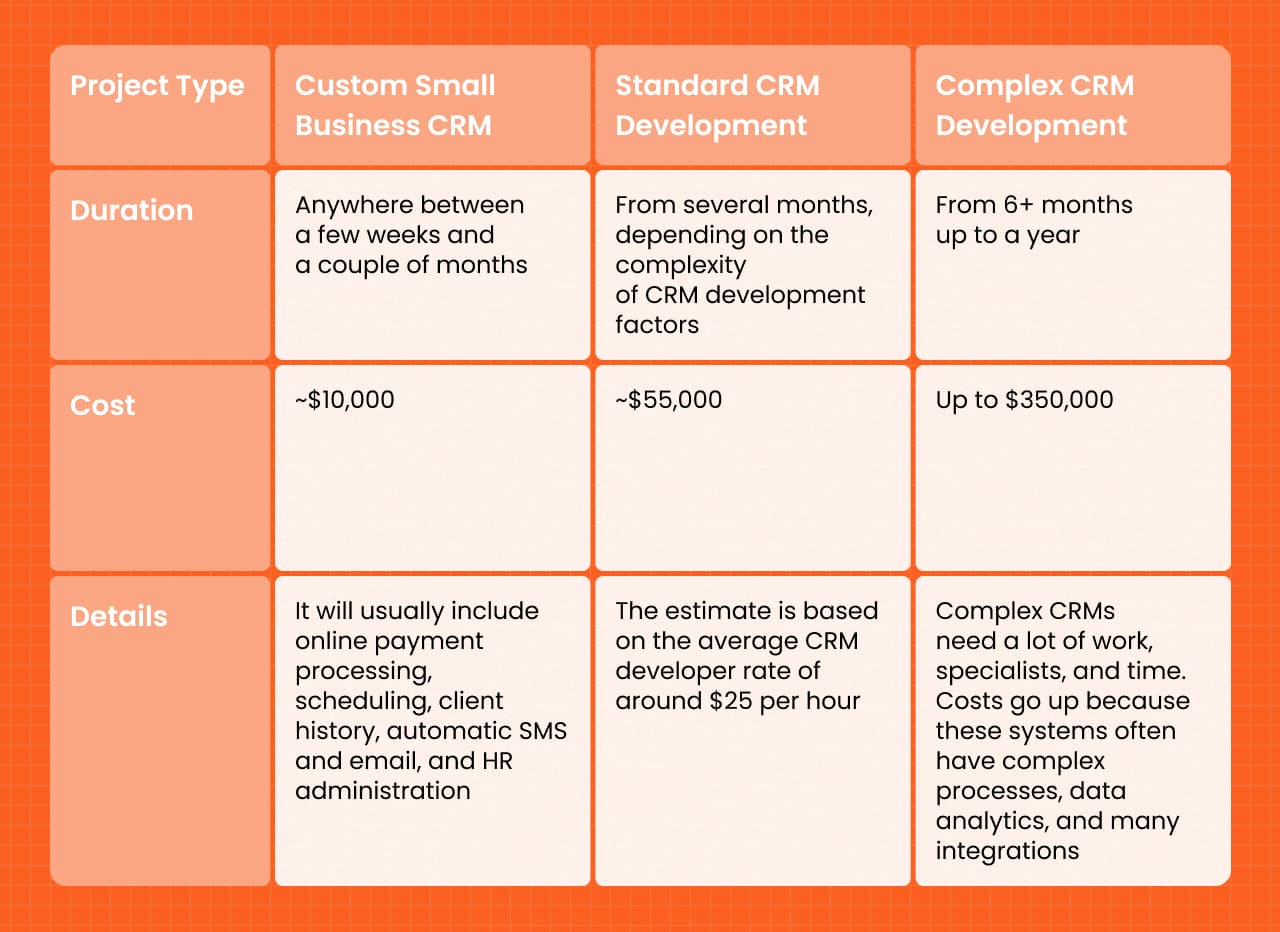
Working with ArtCodeVision, you get the best solution for your business niche. We work within your budget and don’t allow scope creep. We work as your partners and are devoted to bringing it to the top ranks in your industry.
Schedule a call with our CRM specialists and get a CRM development estimate with detailed features you need to make your idea happen for free!






